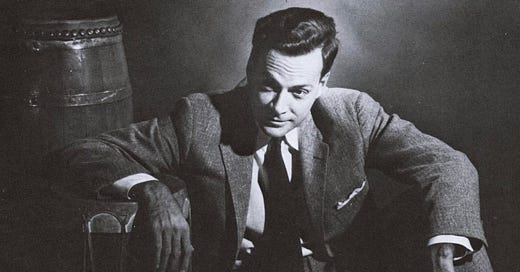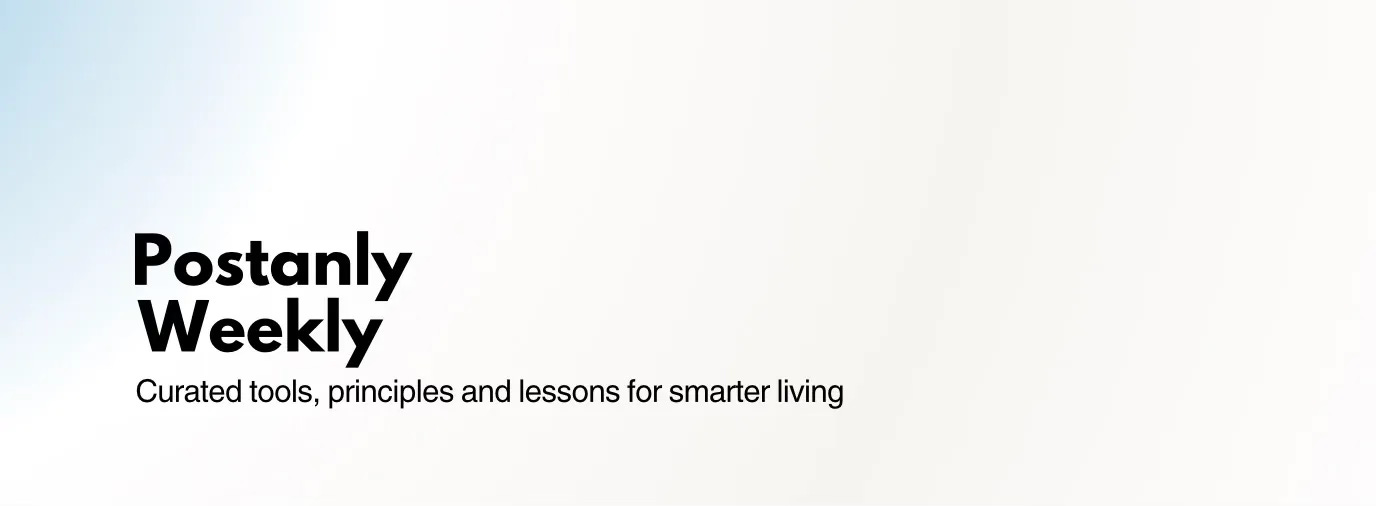Hello everyone,
Postanly Weekly is a reader-supported smarter living newsletter. To support my work, you can upgrade to a paid subscription for $7 per month or $40 for an entire year. With a modest yearly contribution you’re not only helping keep Postanly Weekly going, you also get free access to Thinking Toolbox (mental models for life) and Mental Wealth Toolbox (practical concepts for smarter decisions).
In partnership with Shortform
Want to improve your reading with a nonfiction book summary app?
Shortform is one to try. Most book-summary apps just hit you with the highlights, but Shortform goes way deeper. They’ve got detailed guides that dive into the heart of the book. Plus, with thousands of titles across 30+ categories—whether you're digging into business, health, self-help, parenting, or something else entirely—they’ve got you covered. It gets better.
Shortform doesn’t stop at books. They’ve got guides for articles, podcasts, and even a browser extension that can whip up summaries for anything online. Experience a new level of understanding and personal growth with Shortform. Postanly readers get a free trial PLUS 20% discount and a FREE trial!, so you can finally dive deep into some of my favourites like:
Four Thousand Weeks: Take control of your time and live your best life with lessons from Oliver Burkeman.
Life, Curiosity, and Adventure
One of the most challenging things to do in life is to live a well-rounded life. It can be easy to get caught up in your work, family, and friends and forget about yourself. You can easily fall into that trap of doing things “just because you have to” or for the sake of “keeping up with the Joneses.”
To live an authentic and satisfying life, it’s essential to prioritise self-exploration and understand yourself better every day. Having a rich life is about finding fulfilment and balance with the short time you have on this planet — it takes deliberate action to find your purpose and live with intention, though.
Richard P. Feynman was one of the most brilliant theoretical physicists of all time. He won the Nobel Prize for his work in quantum physics. But what many people don’t know is that he was also a great lifelong learner.
He sought to explore the many sides of his personality that made him come alive. He was also well known for his sense of humour and quirky personality.
Beyond the confines of the classroom, Feynman was known for his commitment to science. His curiosity and desire to understand how things work led him to investigate many cross-domain subjects.
The thirst for knowledge is what sets true scientists apart from everyone else. They are constantly searching for new ways to understand the world around them — and they never stop learning until they find them.
In a letter to his younger brother, Richard Feynman described the role of a scientist as someone who is “committed to finding the truth, no matter where it leads.”
Feynman’s wisdom applies not only to scientific investigation but also can be applied to everyday life. In his book ‘Surely You’re Joking Mr. Feynman’ he said if you ask me what gives me meaning in life — it’s the things I do that don’t have anything to do with science or math — the things that aren’t serious; the things that are just fun and playful.
Those things keep me going because they make me feel good about myself and give meaning to my life. Looking at the totality of Richard Feynman’s life, what stands out to me the most is not his scientific achievements. There have been many equally brilliant scientists through the ages.
What strikes me is that he also lived a full, rich, well-rounded life. He didn’t limit himself to excellence in just one arena or force himself to fit into a particular mold. He explored his curiosities.
Do things outside work that makes you come alive
“Nobody ever figures out what life is all about, and it doesn’t matter. Explore the world. Nearly everything is really interesting if you go into it deeply enough,” Feynman said.
While his contributions to quantum mechanics, quantum electrodynamics, and statistical mechanics are unparalleled, he was also well-versed in other subjects. Feynman had interests outside of science that were just as strong, perhaps even stronger. For instance, he was a talented saxophonist. He also loved biology and anthropological fieldwork.
But it wasn’t all fun and games for Feynman — he believed that living a broad life made him a better scientist. Feynman was dedicated to keeping his other interests active and balanced.
He juggled playing in a local band with bluegrass music, learning how to play the flute, travelling with friends to new places around the world, mastering painting techniques from books, learning how to draw cartoons and lots more besides science.
Feynman was always trying to figure something out. He read almost everything he could get his hands on — and took every opportunity he could to learn something new practically every day. He was curious at heart.
Although this quest was not always easy, it was all part of a larger mission. Many of Feynman’s most extraordinary insights came from his willingness to look at the world around him with an open mind.
He thought the most essential thing in life was to learn how to laugh and to learn how to give laughter away. When you can do that, you can accomplish anything. “The highest forms of understanding we can achieve are laughter and human compassion,” Feynman said.
Moreover, he had an inspiring outlook on life and loved to teach others about the world around them. The more time you spend on the things that are important to you, the more likely it is that you’ll be able to achieve a full, well-rounded life.
Pursue your interests in the most undisciplined, irreverent and original manner
“Do what you get the most pleasure from. Is it to build a cloud chamber? Then go on doing things like that. Develop your talents wherever they may lead. Damn the torpedoes — full speed ahead! If you have any talent,or any occupation that delights you,do it, and do it to the hilt,” he said.
Feynman travelled, made music, raised a tight-knit family, formed many close friendships, and contributed to important causes, always pursuing what fired his imagination regardless of whether it was popular.
The more time you spend doing things that interest you, the more likely you will have a fulfilling life. One of the best ways to have a full life is to get involved in activities that feed your mind and heart.
“Study hard what interests you the most in the most undisciplined, irreverent and original manner possible,” says Feynmann.
There’s no shortage of things to explore and learn in this world, and there’s no reason you should ever feel bored or overstuffed with information. By getting out there and exploring, you’re sure to find something that sparks your interest and can help you live a full life.
Food for thought
Greek historian and geographer Herodotus noted, “If a man insisted always on being serious, and never allowed himself a bit of fun and relaxation, he would go mad or become unstable without knowing it.”
I get it.
Responsibility is important. But you can’t be a rock all the time. You’ll burn out. Stress builds. You might not even notice the cracks appearing. One day, snap. You become unpredictable, a loose cannon. You need release. Let yourself loosen up.
If life is not fun, you’re not doing it right.
I truly believe that if we are able to live to 150 years old, then we should be able to live (in good health) for as long as we want. If we can advance longevity science to the point where we reach past 150 years old, there’s a good chance that we’ve solved most of the big problems that kill most people. If people are living to 150, it probably means we’ve found a reliable way to cure cancer. It probably means we’ve found ways of preventing heart disease or other chronic conditions that kill most people. It probably means we’ve developed ways to replace organs or cells that break down and lose their function over time.
Author James Clear on sprint downhill, not grind uphill
“Look for situations where the energy is already flowing downhill. Invest in relationships where there is already mutual respect. Create products that tap into a desire people already have. Work on projects that play to your strengths.
And then, once the potential of the situation is already working for you, add fuel to the fire. Pour yourself into the craft. Act as if you have to outwork everyone else—even though the wind is at your back.
The idea is to sprint downhill, not grind uphill.”
William J. Reilly (author of How To Avoid Work) on meaningful work
“Most [people] have the ridiculous notion that anything they do which produces an income is work — and that anything they do outside ‘working’ hours is play. There is no logic to that. Your life is too short and too valuable to fritter away in work.
If you don’t get out now, you may end up like the frog that is placed in a pot of fresh water on the stove. As the temperature is gradually increased, the frog feels restless and uncomfortable, but not uncomfortable enough to jump out. Without being aware that a change is taking place, he is gradually lulled into unconsciousness.
Much the same thing happens when you take a person and put him in a job which he does not like. He gets irritable in his groove. His duties soon become a monotonous routine that slowly dulls his senses.
As I walk into offices, through factories and stores, I often find myself looking into the expressionless faces of people going through mechanical motions. They are people whose minds are stunned and slowly dying.”
> My best newsletter recommendations
Have a look at our favourite picks → Topics covered: learning, finance, starting up, productivity, technology, career, better living, seo, venture capital and more.
Explore the complete list of newsletters
Thanks for reading!
Until next week,
Thomas
Medium | All Courses | The Write Life | Philosophy For Modern Life
Postanly Weekly is now a reader-supported publication. To support my work, you can upgrade to a paid subscription for $7 per month or $40 for an entire year. With a modest yearly contribution you’re not only helping keep Postanly Weekly going, you also get free access to Thinking Toolbox (mental models for life) and Mental Wealth Toolbox (practical concepts for smarter decisions).






Typo. Change the word “chance” to “change.” Frog didn’t realize etc.